Providing Divorce Mediation Services Throughout California
Providing Divorce Mediation Services Throughout California
You may have heard of divorce mediation from a friend TV, or the San Jose community.

Reach out to find the best solution for your divorce with trusted professionals.
A consultation is a moment to stop, clear your head, and consider your options—pressure-free. You should treat it like a conversation and not a commitment.
You don’t need to have answers to everything, and you don’t need to have those bulky boxes of documents prepared and at the ready.
The consultation is simply a way to better understand your rights, your intentions, and whether you’re talking to the right professional.
At Families First Mediation, we believe a good consultation should leave you feeling informed, not overwhelmed.
Whether you’re considering mediation, legal representation, or simply clarity about next steps, this guide outlines tips to help you best prepare for that first meeting.
We’ll consider: what you can expect, how to prepare, and some beneficial questions to help you figure out the best way forward.
Book your free divorce consultation with our expert mediator and California’s Super Lawyer, Dina Haddad today.
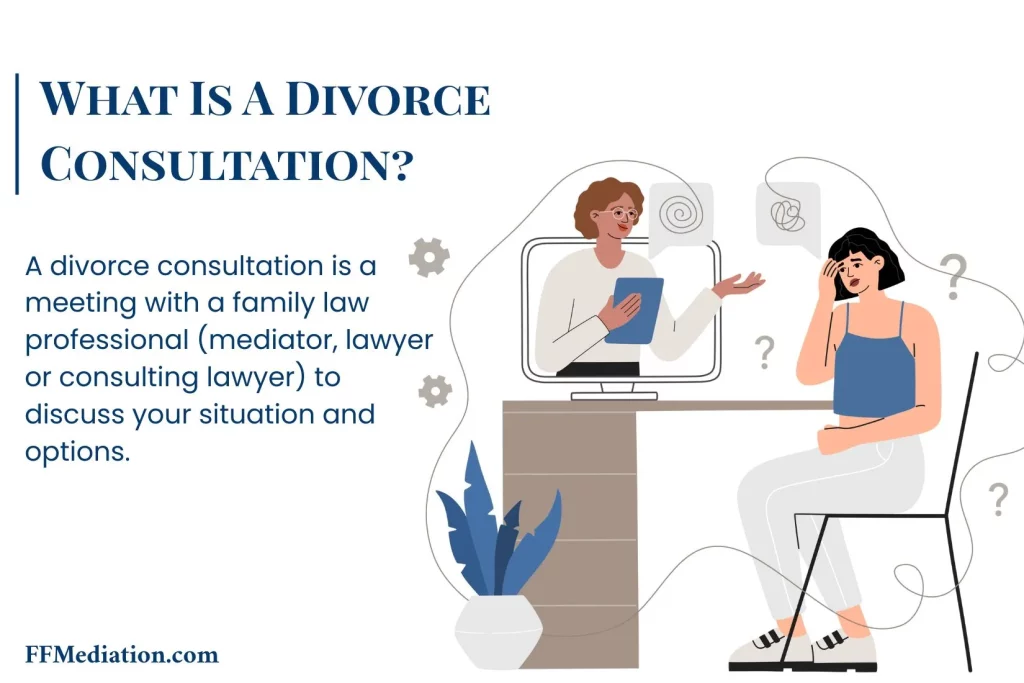
A divorce consultation is a meeting with a family law professional (mediator, lawyer or consulting lawyer) to discuss your situation and options. This is your chance to:
At Families First Mediation, we try to make the consultations low pressure, informative, and focused on your priorities. We are not trying to overwhelm you with legal jargon—we’re trying to help you walk away with a clearer sense of next steps.
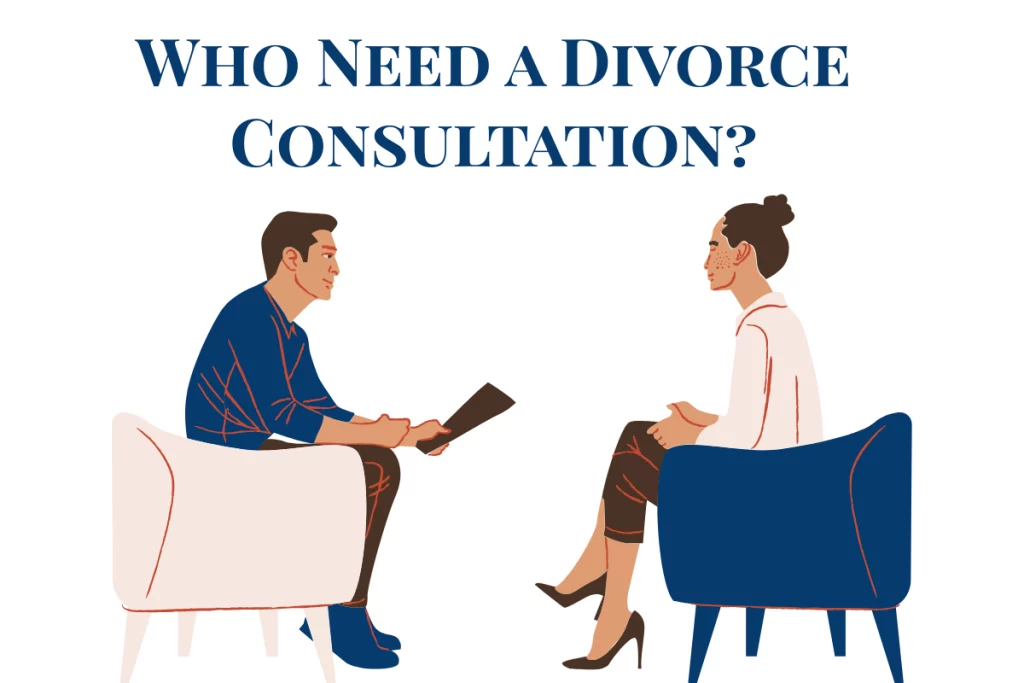
Are you wondering if you should consider a divorce consultation? The answer is easy: If you have been thinking about divorce and are even just considering it, you should have a consultation.
So, who is divorce consultation best for?
When children are involved, divorce is less about the division of assets and more about creating a workable parenting plan.
Even initial consultation includes practical considerations involving the time-sharing schedule, authority to make decisions, and child support calculations.
We can help parents navigate decisions around stability, school districts, extracurriculars, and healthcare.
Even if the split is friendly, learning how courts assess parenting arrangements and what mediation has to offer (that litigation does not) can be helpful.
If you and your spouse can discuss logistics without constant conflict, mediation can save couples tens of thousands compared to litigation.
In our divorce consultation, we take time to compare the two approaches, explaining how mediation is a private process (with no public court record) while litigation is adversarial.
We assist in determining what issues might require engaging legal action and what issues might not.
Many couples realize that even a contentious issue like the family home does not preclude them from collaboratively working together on the other issues.
Entrepreneurs, executives, and investors have some specific issues in divorce. In Families First Mediation consultations, we discuss how to value a professional practice, how to deal with stock options that have vesting schedules, how best to protect valid claims to separate property, etc.
We also consider the tax consequences of the various ways in which whatever is being divided and the documentation that is required.
If you have executive compensation or ownership interests, the timeline for disclosing your financials is important for planning to protect your future finances.
Divorce without splitting assets is possible. It requires something to be met or summary dissolution. Check the link to know further.
For people who are unsure about how the divorce process works, a consultation is a way to clarify options and have information, if desired, without being pressured.
We outline a “roadmap” to legally entitled options, in addition to going through costs and timelines for the alternatives to marriage dissolution, we may also offer referrals for other resources, such as financial planners.
After consultation, many clients eventually find that they can manage the six-month waiting period required by California divorce laws. That’s because they understand the importance of this waiting time and what to do during it.
Learn More: How Much Does Divorce Cost in California?
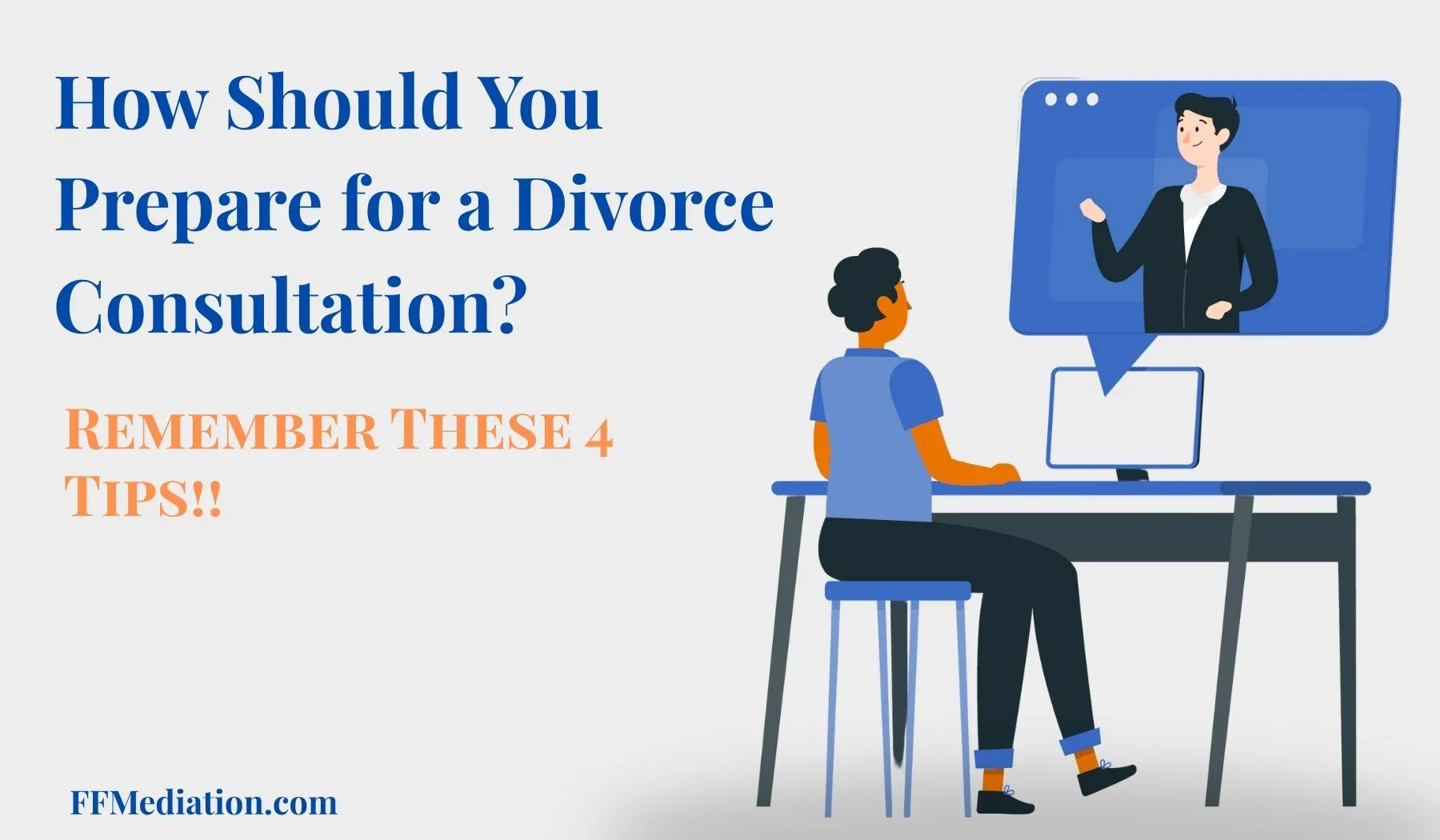
Your divorce consultation shouldn’t add to your stress – it should be focused on stress reduction.
With some modest preparation, you’ll turn your consultation into meaningful, actionable clarity. Here are the exact things I want you to consider as you prepare:
The best consultations are when you are focused on understanding and not performing. Bring your concerns and questions – we will sort the rest out together at Families First Mediation.
Dina Haddad created a useful ‘90-Item Divorce Mediation Checklist to help you prepare better for your divorce mediation. Check now or download it for later.
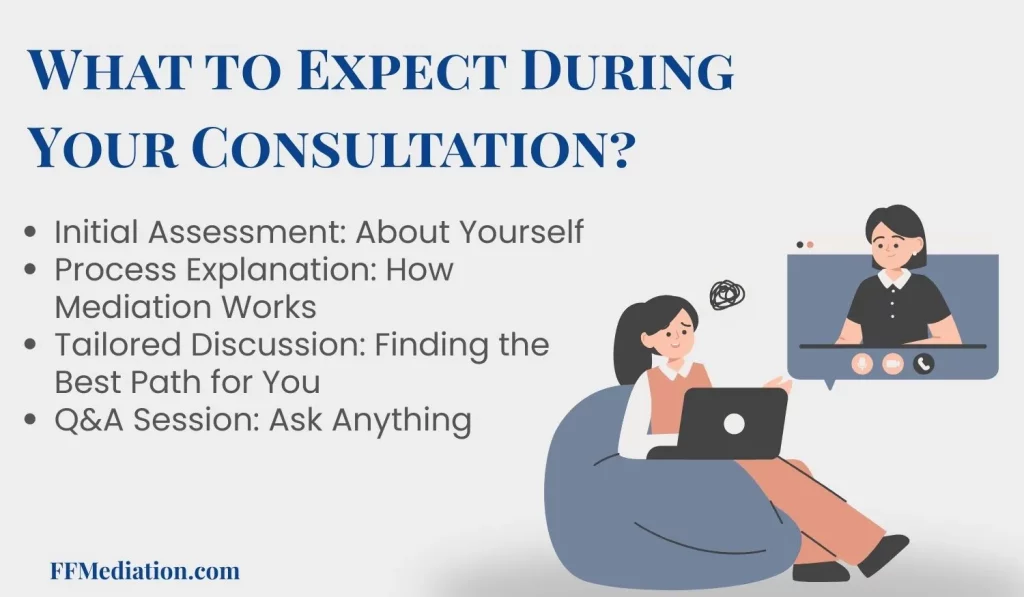
This conversation is intended to help provide you with clarity, not add to your confusion. This is how we will maximize our time together:
By the end of our time together, you will have a better understanding of how mediation works, whether it works for your situation, and what the next steps are, without any obligation or pressure.
We want you to feel informed to make a considered decision about your process, not a rushed one.
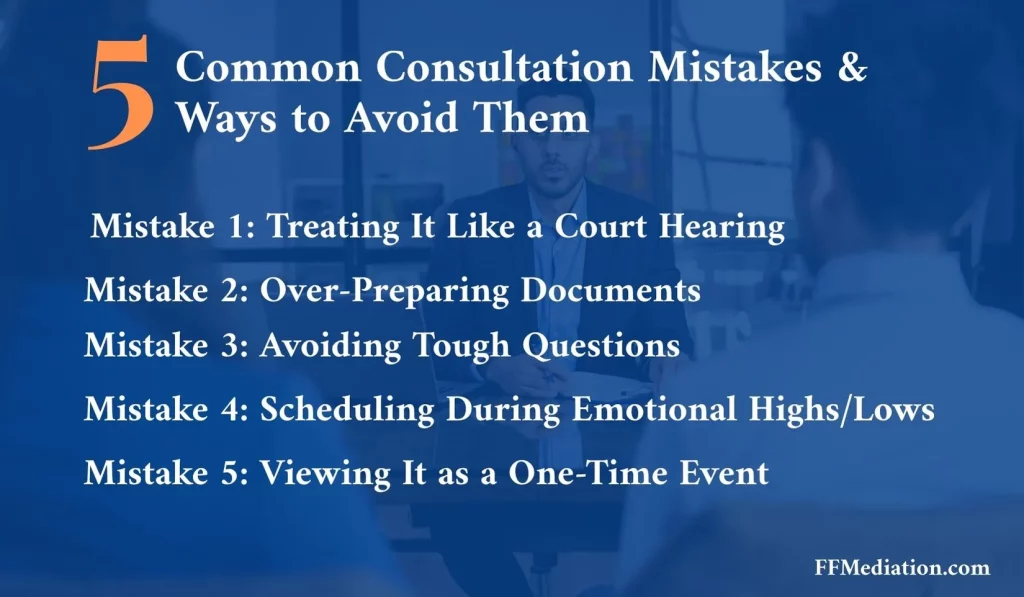
Many clients come to their consultation anticipating working through their matter. Here are ways to avoid the most common mistakes we see:
Some come to the first appointment practicing their angles or being defensive about their position. While it is important to communicate your position, the goal of the consultation isn’t to prove your case.
It is better if, when you come to a consultation, you come to understand the options available to you, not to advocate the outcome you hope for.
Come prepared to discuss the areas of concern without debating positions. A good practitioner will help you rethink conflicts as solvable problems.
While being organized is a great idea, showing up with boxes of mixed up papers really takes the focus of the conversation. You don’t need any mortgage statements or tax returns for the first meeting.
Just bring over:
Many hesitate to ask about fees, worst-case scenarios, or the professional’s track record with cases like yours, but this is what consultations are for.
Think about the three must-ask questions about:
Sometimes, when you book consultations right after an argument or during high levels of stress, it inhibits your capacity for good decision-making.
Book a time when you can be:
Some view consultations as one informational meeting instead of one step in a process.
Leave with:
The most beneficial consultations balance preparation and openness. You are not being assessed; you are assessing whether this direction is right for you and whether the professional is a fit for your unique needs.
At Families First Mediation, we turn ordinary meetings into strategic planning opportunities. From the beginning, we’re focused on your challenges, including both opportunities and barriers to your success.
When paperwork is involved, we make it a ‘phased document request’. Instead of all at once, you only provide documents that will be required when the time comes.
This consultation with one of our expert mediators like Dina Haddad, Esq or Samira Amato, Esq is designed to turn your preparation into an efficient, less complicated, low-conflict process. We explain the options, costs, and how you can successfully mediate your divorce.
Ready to begin? Schedule a free divorce consultation call today!
Read More: Divorce Mediation Tips & Tricks for Productive Divorce.